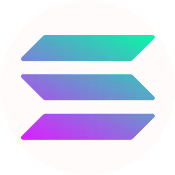When you think of blockchain scalability and speed, Solana often jumps to mind with its record-breaking transaction throughput, while the Internet Computer offers a radically different approach with its internet-scale infrastructure and seamless integration capabilities. These two platforms exemplify the diverse strategies in the blockchain world—from Solana’s focus on raw performance to the Internet Computer’s emphasis on decentralization and web compatibility. In this comparative analysis, we will dissect their architectures, performance metrics, security models, and practical applications to help crypto enthusiasts and investors understand which platform aligns best with their needs.
Short on time? Jump to Solana vs Internet Computer Comparison
Understanding Solana and Internet Computer ?
Solana is a high-performance blockchain launched in 2020 by Solana Labs, aiming to support scalable decentralized applications through innovative consensus mechanisms and data propagation protocols. Its architecture uses a unique combination of Proof of History (PoH) and Tower BFT to achieve transaction speeds of up to 50,000 TPS, making it one of the fastest blockchains available. Solana’s ecosystem is supported by a dedicated team of technologists who have developed several groundbreaking technologies like Gulf Stream for transaction forwarding and Sealevel for parallel smart contracts, which contribute to its high throughput and low latency.
The Internet Computer (ICP), developed by the DFINITY Foundation and launched in 2021, takes a different route by creating a decentralized internet infrastructure capable of hosting a wide range of applications directly on its network. Its architecture leverages a novel consensus mechanism called Threshold Relay, combined with subnet-based sharding, to achieve scalability that supports millions of transactions per second. ICP emphasizes seamless interoperability, low-cost data storage, and the ability to run complex, web-scale applications without traditional centralized cloud providers.
While Solana’s focus on speed and throughput makes it ideal for high-frequency trading, gaming, and real-time analytics, the Internet Computer prioritizes decentralization, security, and seamless web integration for dApps, enterprise solutions, and internet-scale services. Both platforms are pushing the boundaries of blockchain technology, but their core philosophies and technical architectures differ significantly, reflecting their targeted use cases and user bases.
Understanding these foundational differences is crucial for investors and developers seeking to leverage blockchain technology effectively. Solana’s speed comes with challenges, including network outages and security concerns, whereas ICP’s architecture aims for a balanced approach with a focus on scalability, security, and decentralization at an internet scale. This comparison explores these facets in depth, providing a comprehensive view of what each platform offers.
Key Differences Between Solana and Internet Computer
Consensus Mechanism
- Solana: Solana employs a Proof of History (PoH) combined with Tower BFT, which creates a synchronized clock system that drastically reduces consensus time and increases throughput. PoH verifies the passage of time between events, allowing validators to process transactions in parallel and achieve high scalability without sacrificing security. This innovative approach enables Solana to support up to 50,000 TPS, making it ideal for applications requiring rapid transaction processing.
- Internet Computer: The Internet Computer utilizes the Threshold Relay consensus mechanism, which combines randomized sampling and cryptographic randomness to ensure security and scalability. Subnets of independent nodes process transactions and smart contracts concurrently, supporting millions of transactions per second. This architecture emphasizes decentralization and resilience, making ICP suitable for hosting large-scale, internet-connected applications with a focus on security and interoperability.
Architecture and Scalability
- Solana: Solana’s architecture is centered around a single, high-performance blockchain optimized for speed. Its use of parallel processing units, GPU acceleration, and a horizontally scalable data structure allows it to support thousands of transactions per second with minimal latency. The system’s design ensures that performance scales naturally with available bandwidth, SSD speeds, and GPU cores, making it highly adaptable for real-time applications.
- Internet Computer: The Internet Computer’s architecture is based on subnet networks that can dynamically scale, supporting internet-scale applications. Its use of canisters—smart contracts encapsulated in secure, sandboxed environments—enables complex, scalable applications to run seamlessly. ICP’s sharding and subnet design allow it to process a vast number of transactions concurrently, with an emphasis on secure, decentralized, and web-integrated solutions.
Data Storage and Cost
- Solana: Solana’s data storage relies on its distributed ledger, with storage solutions optimized for high throughput and rapid access. The network does not prioritize long-term data storage costs directly, focusing instead on transaction speed and network performance, which can lead to higher storage costs for extensive data archives.
- Internet Computer: The Internet Computer offers low-cost data storage, with the ability to store 1GB of data for approximately $5 annually. Its architecture allows for efficient data management through canisters, enabling developers to deploy scalable applications without incurring prohibitive storage costs, thus supporting the development of data-intensive decentralized apps.
Interoperability
- Solana: Solana currently has limited interoperability features, primarily focusing on its own ecosystem. Cross-chain interoperability is an ongoing development area, often facilitated through third-party bridges, which can introduce security risks and complexity.
- Internet Computer: The Internet Computer excels in interoperability, enabling direct integration with other blockchains like Bitcoin and Ethereum without bridges. This native interoperability enhances its utility for diverse applications, facilitating cross-chain communication and data sharing, making ICP a versatile platform for interconnected decentralized services.
Development Environment and Programming Languages
- Solana: Solana supports smart contract development primarily through Rust and C, leveraging its Sealevel parallel runtime for high-performance applications. Its developer ecosystem is growing rapidly, with tools and SDKs designed to optimize performance and scalability.
- Internet Computer: The Internet Computer utilizes Motoko, a purpose-built programming language optimized for its canister architecture, and also supports Rust. Motoko’s actor-based model simplifies the development of secure, scalable applications. Its WebAssembly foundation ensures portability and performance, lowering barriers for developers and fostering innovation.
Solana vs Internet Computer Comparison
| Feature | ✅ Solana | ✅ Internet Computer |
|---|---|---|
| Transactions Per Second (TPS) | Up to 50,000 TPS | Over 11,000 TPS (average), theoretically supports millions |
| Consensus Mechanism | Proof of History + Tower BFT | Threshold Relay with sharding |
| Data Storage Cost | Variable, optimized for speed | $5 per GB per year |
| Interoperability | Limited, ongoing improvements | Native cross-chain support with Bitcoin, Ethereum |
| Primary Programming Languages | Rust, C | Motoko, Rust |
| Application Focus | High-frequency trading, gaming, DeFi | Web-scale apps, decentralized internet services |
Ideal For
Choose Solana: Developers and investors prioritizing high throughput, low latency, and fast transaction finality.
Choose Internet Computer: Developers seeking scalable, secure, and interoperable decentralized applications with internet-level performance.
Conclusion: Solana vs Internet Computer
Solana has established itself as a leader in transaction speed and throughput, making it an excellent choice for applications that demand rapid, high-volume processing like gaming and DeFi. Its innovative consensus mechanism and parallel processing architecture set new standards in blockchain performance, albeit with some trade-offs in network stability and security concerns that are being actively addressed.
Conversely, the Internet Computer aims to redefine the web infrastructure by enabling developers to deploy large-scale, secure, and interoperable decentralized applications directly on its network. Its emphasis on internet-scale performance, low-cost data storage, and native cross-chain interoperability make it a compelling platform for building the future of web3 services. Ultimately, the choice between the two hinges on whether speed or scalability and decentralization are prioritized, but both platforms are undeniably pushing the frontier of what blockchain technology can achieve.






